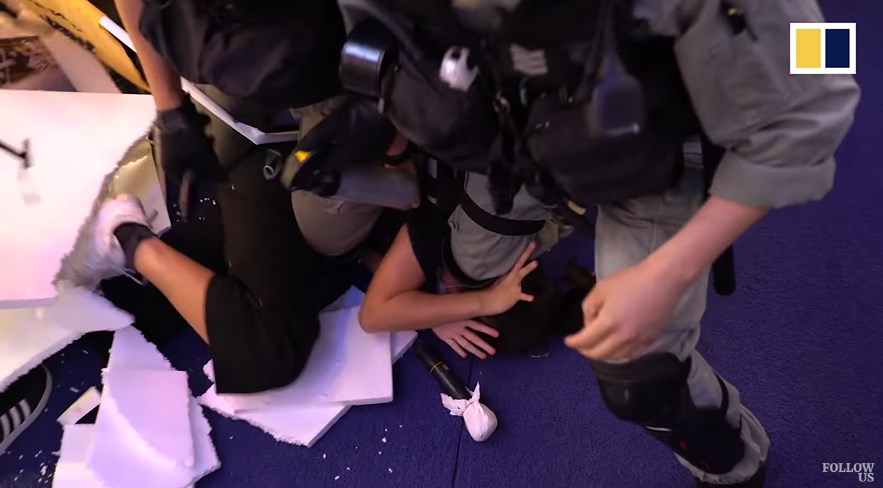Hong Kong police have said that officers used “minimum force” during an arrest on Friday night in which an officer was seen pressing his knee onto a female student’s neck. The incident took place as crowds gathered across the city to mark a year since tear gas was released to clear anti-extradition law protesters from Admiralty.
Footage from the South China Morning Post showed a young woman being pushed to the ground by two riot police officers in Causeway Bay. One officer had his knee on her neck, while the other officer’s knee was on her waist as they made the arrest.

The Hong Kong Secondary Students’ Action Platform – backed by pro-democracy group Demosisto – confirmed the subdued girl was a 16-year-old student and a member of the group. She was later sent to a hospital after police asked her if she needed treatment.
According to the Platform on Telegram, their members had set up a street booth on East Point Road to distribute leaflets about a planned referendum on class boycott action against the impending national security legislation.
The group said that officers of the Police Public Relations Branch (PPRB) told the students that they would not interfere with the booth’s operation. However, a group of riot police kettled the booth and some surrounding citizens around 20 minutes later. Police apprehended at least three members of the group for allegedly taking part in an unlawful assembly.
The Form Five female student told Apple Daily on Sunday that she had been discharged from the hospital. She said she was still “angry and sad” about the way she was treated by police, but she has not lodged an official complaint.
HKFP has contacted the police for comment.
“When they pushed me down, the first feeling was I couldn’t breathe, [it was] very painful,” the student recalled.
In response to enquiries by Stand News on Sunday, police said officers had to disperse the crowds in Causeway Bay and set up cordons because a large group of demonstrators were approaching and clamouring.
The force said the female demonstrator had “resisted and tried to escape,” and officers therefore used “minimum force” to subdue her, adding that the arrest process was “relatively brief” and within protocol.
Police did not directly respond when asked about the use of the knee restraint in their reply.

Police neck restraints have become a worldwide controversy recently, after George Floyd – an African American man – died in police custody as a white officer, Derek Chauvin, pressed his knee into Floyd’s neck for almost nine minutes.
Floyd’s death sparked large-scale protests in the US and around the world, as demonstrators chanted “black lives matter” in opposition to racism and police brutality.
Speaking to reporters a day after the arrest, the Platform’s spokesman Isaac Cheng, who is also the vice-chair of Demosisto, slammed the police as making a “violent arrest,” adding that media footage showed the girl did not struggle during the incident.
“Does this mean the lives of Hong Kong secondary students do not matter?” Cheng asked.
